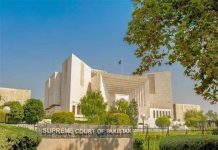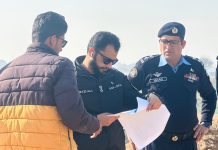By Hina Kiyani
ISLAMABAD: Health Services Academy, Ministry of National Health Services Regulations and Coordination and Health and Population Think Tank held an inter-national consultative meeting on “Economic Aspects of COVID-19 in Pakistan†. The meeting invited international technical experts and high level Federal and Provincial Government officials to share evidence and highlight efforts to mitigate the negative impacts of COVID-19 on Pakistan’s economy.
There was detailed discussion on ways to improve public spending on health, explore alternative financing mechanisms to enhance revenue generating capacity, reprioritize health budgets and steps to revive the economy. Federal Minister and Special Assistant to the Prime Minister on Poverty Alleviation and Social Protection, Dr Sania Nishtar highlighted Government response to COVID-19, bearing the fact that a large percentage of Pakistan’s population is below the poverty line that could be hard hit by the pandemic.
She elaborated how an immediate financial protection mechanism was developed for the very poor people and those working in the informal sector of Pakistan. Dr. Shabnum Sarfraz, Member Social Sector & Devolution, Ministry of Planning, Development & Special Initiatives, highlighted inter-ministerial collaboration and a national action plan for COVID-19 along with a report on macroeconomic impact analysis. The Planning Ministry promptly established a coordination mechanism of foreign assistance to contain the impact of COVID-19.
Dr. Awad Mataria from the World Health Organization highlighted the need for transforming health financing mechanisms and need for different funding strategies to make money available for health in times of need. Mr. Eazaz Aslam Dar, Additional Secretary Economic Affairs Division, discussed health budget allocation and expenditures and difficulties in the processes that may result in underutilization of services or lapses in funds due to lack of absorptive capacity. Dr. Ali Hamandi from the World Bank talked about the need for creating a fiscal space for health and the importance of overall conducive economic environment in which more funds can be mobilized for health. Dr. Zulfiqar A. Bhutta, an international public health expert, presented a multi-country evidence about the direct and indirect socio-economic impacts of COVID-19.
The meeting invited feedback and recommendations from the stakeholders on key strategic questions deliberated in the meeting. The federal and provincial leadership along with experts and development partners agreed to continue work in this important area and identified issues and challenges that may hinder the efforts for economic revival. In this regard, improved data collection and analysis, efficient use of existing resources and controlling wasteful use of resources, emergency preparedness were noted for improvements in the system.
The meeting was concluded with a consensus of enhanced collaborative efforts to cope with the economic challenges of Covid-19 for Pakistan, while ensuring a social and economic progression for the country. Syed Atta-ur-Rehman, Additional Secretary Ministry of National Health Services Regulations and Coordination, committed on behalf of Ministry of Health to strive for better efficiency in fund utilization as per recommendations and enhance efforts for securing more funds for health. The Vice Chancellor of Health Services Academy pledged continued support for further work in this important area and thanked the participants for joining.





